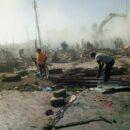The AU Panel and the Justice Challenge (1)
Speaking in Addis Ababa a few days ago, President Thabo Mbeki, Chair of the AU Panel on Darfur, did not divulge what the Panel’s position would be on the question of how best to bring justice to Darfur. Throughout the consultations and hearings over the last months, when talking on this point, Pres. Mbeki has been careful to stick to some basic facts and to ask questions. The Panel has heard many different and diverging opinions on these matters””some of which I will recount in the following postings. But, as he noted, “the central issue is that everybody agrees that this matter of justice is important.” Beyond that, there are those who argue for the ICC, and those who insist that Sudanese mechanisms are the only option.
A second observation is also important. The AU Panel is mandated by the AU, which has taken certain positions on the issue of justice in Darfur. The Panel has been tasked with making recommendations to the AU. It is not restricted to making recommendations which accord with existing AU policy. The principal constraint on the Panel’s recommendations, repeatedly emphasized by Pres. Mbeki, is that they are only meaningful insofar as they are actually implemented””whatever the Panel proposes must be workable.
In a series of postings, I will consider the Sudanese opinions heard by the AU Panel on Darfur and the response of the Panellists to the challenges of justice in Sudan. The first posting is on the Panel’s own position. The second and third postings summarize and reflect on opinions put forward by Sudanese participants in the hearings, on the themes of (a) the importance and scope of justice and (b) options for pursuing justice.
The Position of the AUPD
Repeatedly, in different public meetings, Darfurians challenged the AU Panel on the question of justice. Particularly, people sympathetic to the armed movements, were suspicious of the Panel’s agenda. In Geneina, one native administration representative asked, “Is the Panel completely independent or under the influences of the Sudan Government or armed movements?” (His real concern was whether the Panel was independent of the government””the reference to the movements was just political cover.)
Pres. Mbeki answered, “We are now in 2009 but the issue is not solved. … The AU said to us, “˜you must be an independent panel, not taking instructions from the AU.’ We must also be able, possibly, even to criticize the AU itself. The Panel must make suggestions to the AU, in the same way that it makes suggestions about everyone else.”
In Zalingei, the IDPs were not so circumspect. They came straight to the point. Their delegates said:
“We as IDPs determine:
1. The AU does not possess the competence, credibility, neutrality and independence in addressing the issue of Darfur, through the apparent backing of the Sudan government headed by Omar al Bashir.
2. The AUDP does not possess the competence, credibility, neutrality and correct understanding. [We reject] Thabo Mbeki’s clear support for Omar al Bashir on the ICC issue. …”
The allegation that Pres. Mbeki was intent on salvaging Pres. Bashir came up several times in the discussion. One woman said, “We fear you are here to defend the criminal Omar al Bashir.” One man stood up and said, “Seven members of my family were killed. How should I feel if Thabo Mbeki says that Omar al Bashir should not go to court?”
Pres. Mbeki challenged him, “from where did you get this information that I said that President Bashir should not go to court?” The man responded, “it is well known.” He then said that the Africans were the ones saying Bashir should not go to the ICC, citing the early June meeting in Addis Ababa to discuss the African position on the ICC. This reply did not satisfy Pres. Mbeki, who continued to press him, “I asked you a question. Please answer it. You made an allegation. From where did you get this information?” The man said it was the BBC.
In response, Pres. Mbeki made several points. First, he suggested that the man should obtain his information directly from the source, in Africa, not from outside Africa. Mbeki said that he had not made any statement on whether Bashir should go court, or not. Second, he pointed out that the outcome of the June meeting in Addis Ababa had not been withdrawal from the ICC. Third, he explained the content of the resolutions of the Peace and Security Council on the issue, and promised to ensure that copies of the resolutions were sent so that the people could study them first hand and not rely on others’ interpretations.
There were several other discussions of this kind. One of the most interesting was in the SLA-held area of Ain Siro. After listening to some strong statements in support of the ICC arrest warrant against President Omar al Bashir, Pres. Mbeki put a question to the people assembled:
“I will meet President Bashir, and I will say to him, there is a school here, which needs books, money for the teachers, etc. I would like to say there is a clinic which needs medicine so people have a health service. Also I would like to say that it’s important that the UN and the government must make sure food supplies are not stopped and will reach Ain Siro. [I will report that] people want peace, they want agreements respected, but their experience is that this is not so.”
He came to the point: “Here is my problem. This leadership is saying that, instead of raising those things, I should arrest him.”
Ali Haroun, the senior SLA commander in the area, gave a reply that illuminated the complexities of the question””and didn’t give a simple answer one way or the other.
“Part of the answer is that Omar al Bashir is not respecting agreements. As for arresting him, with all due respect, there is no capacity for you to arrest him. But if the question is, do the people of Darfur want to prosecute him? … There are political and legal aspects. On the political aspect, we made a revolution with demands for rights. We are still on that path. Who could sign an agreement with us? Omar al Bashir””I could sign with him. On the legal aspect, since he has committed crimes against Darfurians… if he goes back to the people who suffered, they should decide whether they want to prosecute or not.”
In summary, the Panel is still at the stage of asking people””especially Darfurians””for their opinions and proposals. There are certain realities, such as the positions taken by the AU heads of state, and by the ICC, which constrain and influence what the AU Panel can realistically recommend, but there are no overriding determinants on what it may decide.







Justice and accountability to achieve it are two supreme values that no one can deny thier urgency to stabilize societies, heal the wounds of victims, maintain the spirit of reconciliation and hold the perpetrators accountable for thier abuses. However, sticking to justice as a slogan and as a subject of political mobilization will not allow us to achieve those gains instead it will be an issue of manipulation and politicization. Pursuing justice to its essence far from exploitation by beneficiaries will be the only way that will absolutely bring satisfaction and relief to the people of Darfur.
The intervention of outsiders, like the ICC, in the issue of justice in Darfur has been a complication factor taking into an account its judicial measures which are not adapted to the traditional system of judging being pursued in Darfur for centuries through which it shows exceptional capabilities of stabilizing communities and preserving thier integrity. The reliance on the ICC as the only orginization that will achieve justice for the Darfurians isolates other effective social organs from playing thier very role in thier own societies. The native administration was the wisdom behind the conservation of the Darfuri social fabric in the past through very wise leadership, guidance and intervention. Strengthening the role the native administration in the issue of accountability will be very valuable to achieve a domestic justice that every Darfurian will accept and feel familiar with rather than pursuing a one from overseas.
Dear Abdallah Khalil,
Thank you very much for your contribution.
Although I find myself in total agreement with you regarding the importance of justice for the Darfur people, I find it extremely difficult, on the other hand, to understand or to accept your emphasis on the local judiciary system in this very context.
In my understanding, supporting the ICC initiative does not close the door in front of the local system to play whatever role that they are capable of playing. But also as Sudanese, I see these systems were devised historically to deal with a certain level of local or domestic issues, and not with issues that amount to bringing heads of states and central government officials to justice. May be I am not quite versed in this area of our history, but I don’t recall the local judiciary system was ever able to perform that sort of judiciary roles.
Yes, I agree that as far as the traditional tribal and nomads-farmers seasonal conflicts are concerned, these traditional systems were always able to handle the situation, and I strongly believe that they should be supported and strengthened in this regards, as this will also contribute to the local peace building and conflict resolution processes.
However, the magnitude of the issues in Darfur today, stands at relatively different and more complicated grounds and the stakes are interlinked with lots of regional and international players and interests, that are far beyond the reach of our traditional systems, and may be that is one reason why we should all appreciate and value what the ICC is trying to do, even though it might have been criticized for being too righteous about justice to the extent of compromising peace, and albeit the fact that some of us see justice and peace as two faces of the same coin or that it is inevitable for peace in Darfur to come with some price and not as a free handout.
Dear Ahmed Hassan,
Thank you very much for your reply and interest.
The issue of justice in Darfur is wider than exclusively limiting it to hold the president and some top officials accountable as being pursued by the International Criminal Court (ICC) which, in my opinion, represents a mere reduction of a greater social issue. Pursuing of justice in Darfur through the intervention of international judicial institutes like the ICC may achieve a sort of satisfaction for the political elite and opponents of the regime in Khartoum, but would it be of value in achieving real and touchable improvement on the ground? I doubt, because achievement of justice as an absolute value shouldn’t be politicized or manipulated to attain at liquidation of political disputes.
If, on the other hand, justice is pursued to achieve social reconciliation, restoration of peaceful co-existance and maintainance of the social fabric then it is the work of the grass root people and thier social and traditional organs. We shouldn’t allow the complications of the issue to distract us from considering what justice will essentially bring to us.